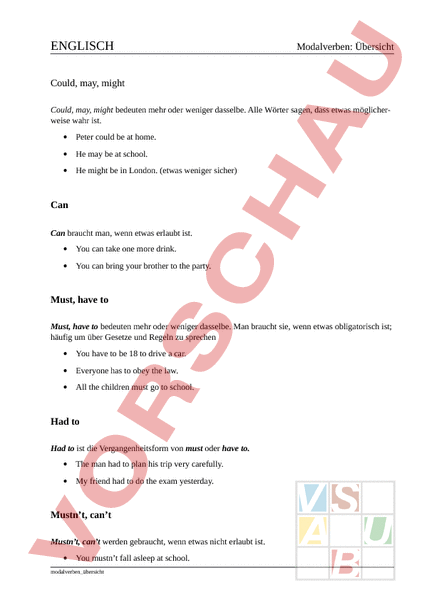Arbeitsblatt: ni3 unit 3
Material-Details
Übersicht über die Modalverven
Englisch
Grammatik
klassenübergreifend
2 Seiten
Statistik
145457
469
0
29.03.2015
Autor/in
Astrid Schwartz
Land: Schweiz
Registriert vor 2006
Textauszüge aus dem Inhalt:
ENGLISCH Modalverben: Übersicht Could, may, might Could, may, might bedeuten mehr oder weniger dasselbe. Alle Wörter sagen, dass etwas möglicherweise wahr ist. • Peter could be at home. • He may be at school. • He might be in London. (etwas weniger sicher) Can Can braucht man, wenn etwas erlaubt ist. • You can take one more drink. • You can bring your brother to the party. Must, have to Must, have to bedeuten mehr oder weniger dasselbe. Man braucht sie, wenn etwas obligatorisch ist; häufig um über Gesetze und Regeln zu sprechen • You have to be 18 to drive car. • Everyone has to obey the law. • All the children must go to school. Had to Had to ist die Vergangenheitsform von must oder have to. • The man had to plan his trip very carefully. • My friend had to do the exam yesterday. Mustnt, cant Mustnt, cant werden gebraucht, wenn etwas nicht erlaubt ist. • You mustnt fall asleep at school. modalverben_übersicht • You cant smoke in restaurant. Dont have to Dont have to sagt, dass etwas nicht unbedingt nötig ist. • You dont have to be at the station at 7 oclock. • You dont have to slow down here. modalverben_übersicht Should, ought to, shouldn‘t Should, ought to, shouldn‘t braucht man, um jemanden zu warnen oder um Ratschläge zu geben. Should und ought to bedeuten dasselbe. Es ist weniger stark als have to oder must. • You should do your homework properly. • You shouldnt copy your exercises. • You ought to have word with their parents. Had better Had better (Es wäre besser) kann anstatt should gebraucht werden, wenn im Moment etwas sehr wichtig ist. • should ask the doctor about the pain in my stomach. • had better ask the doctor about the pain in my stomach. • We should leave early enough. • We had better leave early enough. modalverben_übersicht
